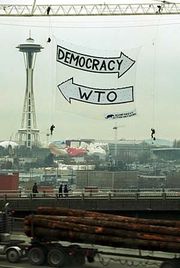There is progress on globalisation issues if you look for it, though how fast it comes and how far it takes us is a moot point.
Think back to Seattle 1999, and the anti-WTO riots, a landmark moment for global justice campaigners seeking fairer economic treatment for the world’s poor. The power of the IMF, the World Bank and the World Trade Organisation, controlled by richer countries to the great advantage of their larger corporations, appeared massive and unchallengeable at the time. Capitalism claimed to have triumphed over all alternatives, the doctrine of “free” markets held sway. Much less so now.
As the writer Naomi Klein craftfully points out in this Alternet article, it is in Latin America that this change is most evident. These were the countries that most suffered under the hyper-capitalism of Milton Friedman and his Chicago School economics but they are now finding their feet. Though the trend has been clear for some time, Klein’s piece offers a useful synopsis.
Witness, first, the International Monetary Fund’s loss of influence in the region:
In 2005 Latin America made up 80 percent of the IMF’s total lending portfolio; the continent now represents just 1 percent–a sea change in only two years.
And marvel at the fate of its twins during the same short space of time:
When Paul Wolfowitz was forced to resign as president of the World Bank in May, it was clear that the institution needed to take desperate measures to rescue itself from its profound crisis of credibility. In the midst of the Wolfowitz affair, the Financial Times reported that when World Bank managers dispensed advice in the developing world, “they were now laughed at.” Add the collapse of the World Trade Organization talks in 2006 (prompting declarations that “globalization is dead”), and it appears that the three main institutions responsible for imposing the Chicago School ideology under the guise of economic inevitability are at risk of extinction.
My only gripe would be with Klein’s unquestioning trust in the good faith of all the Latin American leaders she names in her piece. While I would give Venezuelan President Hugo Chavez many more marks for democracy than I would his U.S. counterpart, he still makes me nervous. The piece should also have made reference to the zapatistas and their influence not only on the region but also on the entire global justice movement.

Leave a comment